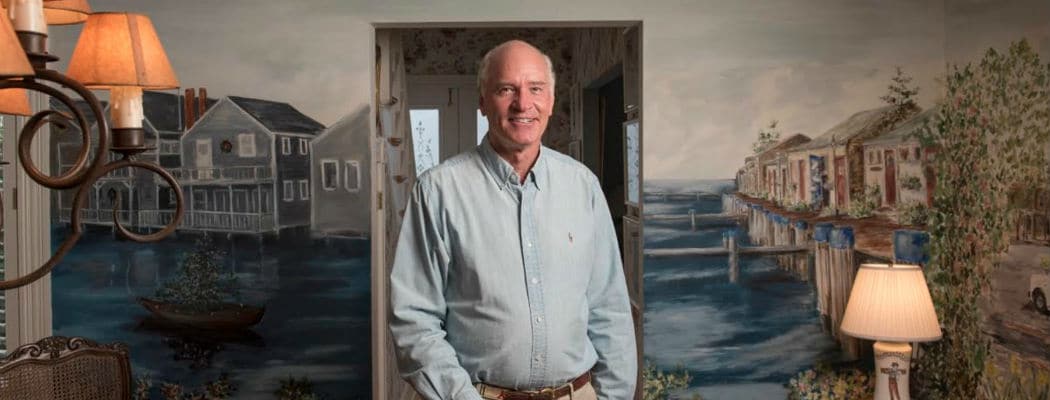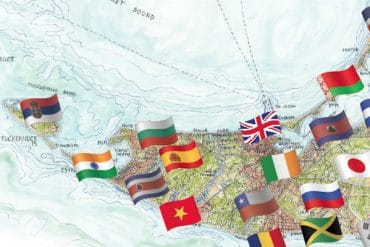Cape and the Islands congressman Bill Keating discusses the many issues impacting Nantucket and the rest of the country.
For nearly seven years, Congressman Bill Keating has represented the Cape and the Islands in the House of Representatives, championing a number of causes that hold particular significance to Nantucketers. This past August, Congressman Keating was on the island meeting with community leaders and learning about new concerns facing the island that might require federal assistance. N Magazine met with Congressman Keating to discuss these issues and others across the country.
 N MAGAZINE: One of the critical issues facing the island that you’ve taken a leadership role in is the H-2B work visa program.
N MAGAZINE: One of the critical issues facing the island that you’ve taken a leadership role in is the H-2B work visa program.
KEATING: The program impacts the whole country. Every six months, the country is allowed 33,000 H-2B visas. That’s not a lot. Four times in the last eleven years, we’ve dealt with demand [for H-2B visa workers] by raising the cap on returning workers. Why returning workers? These are people that have been trained and hit the ground running. Many of them go back to the same establishments. All the visa problems that some of my colleagues are sensitive to — people overstaying their visas as a way of getting around immigration — are not problems with H-2B visas. What we sought to do this year is what has been done those other times in the past: just simply raise the cap. In April, I was able to amass over thirty of my colleagues, bipartisan colleagues, to help raise the cap.
N MAGAZINE: How has the Trump administration impacted the H-2B visa program?
KEATING: Once we got them on board, they came up with a new process that created a whole new set of problems for people around the country. The irony is that an administration that said it was pro-business and was going to do away with restrictions, requirements and regulations created a process that did just that. It made business people reluctant to even participate in it. So going forward I think we should work to do away with that language and go back to the concept of just raising the cap again.
N MAGAZINE: Another issue that dovetails with the worker shortage on Nantucket is housing. What have you learned about this?
KEATING: The housing initiative that’s taking place on Nantucket is really impressive. Their plan is to immediately go from 2 percent affordable housing to seven, maybe 9 percent. This community deserves enormous credit for taking the initiative themselves. They’re doing it because they understand how important housing is to the economy and to the makeup of the community. People who live here should be very pleased with their local leadership.
 N MAGAZINE: As with most of the country, the opiate crisis is crushing the Cape and the Islands. What’s one of your greatest concerns on this front?
N MAGAZINE: As with most of the country, the opiate crisis is crushing the Cape and the Islands. What’s one of your greatest concerns on this front?
KEATING: One of the greatest threats, both here on Nantucket and around the country, to dealing with this terrible epidemic is undercutting the Affordable Care Act. The Affordable Care Act requires all insurance companies treat opiate addiction as a basic healthcare coverage. This was extremely significant in fighting this epidemic. The bill that passed the House and the one considered in the Senate did away with that guarantee. That was front line treatment that is necessary in dealing with this, and it’s effective. I’ve lost a cousin to opiate overdose. I also have a relative very close to me that’s a decade and a half into recovery — and it’s not easy. Opiate addiction is a recurring brain disease. We have 140 or so people die every day in our country right now. It’s clearly an epidemic. The resources have to be in place.
N MAGAZINE: There’s a contingent of Nantucket charter fishermen that have taken political action to ward off commercial fishermen they say are decimating our squid population, and in turn, our fishery. What’s your take on this situation?
KEATING: The fishing issue is a complex one. I have every aspect of the fishing industry represented in my district. In New Bedford, I have the highest per-dollar yield for any commercial port. I have the hook fishermen in Cape Cod and the Islands. Then I have hybrids of those in the South Shore. They run into conflict, but there has been a change in tone over the last few years. Everyone is on board as far as sustainability. Many of the commercial fishermen get a bad rap because people think they don’t care about sustainability — they do. But people have to realize on a bigger scale that climate change is a huge factor in what’s going on. When we look at sustainability, we better acknowledge climate change. Also, there’s an overwhelming amount of fish out there. More than we’d ever need. But they’re not the typical variety that we’re used to eating around here. We’ve got to be able to look at those fish and create a market for them.
N MAGAZINE: Are there any issues under the radar that Nantucketers should be more aware of?
KEATING: People should be more aware of how global issues affect them right in their communities in terms of jobs. For instance, during the G20 summit, Japan came in with a free trade agreement with the European Union. That should have been the US. I’m not a free-trader generally speaking, but the ability for the United States and the European Union to have a trade agreement would be enormous. That trade agreement would have resulted in a 20 percent increase in Massachusetts exports in the first year. Those exports translate directly to good jobs that pay well and have a future. I don’t think people understand how these international agreements can affect them here at home.
N MAGAZINE: Does President Trump understand that?
KEATING: No. Walling ourselves off is the exact opposite of what we should be doing. That translates directly to our standard of living, our jobs, the ability of our kids to get jobs. Those jobs are going to go elsewhere. We have to make people more aware that if they want more jobs in this country, if they want a better standard of living for themselves and their children, if they want revenues so we can have social programs, we have to be a global partner.
 N MAGAZINE: Do you believe we risk losing our leadership position in the world?
N MAGAZINE: Do you believe we risk losing our leadership position in the world?
KEATING: We already are. I’m one of the more senior members on Foreign Affairs. I have private conversations all the time with leaders from other countries and with companies from other countries functioning in the US that are creating jobs in the US. This administration is already affecting them. We are the beacon for democracy, human rights, freedom of the press, gender equality — all of these issues. Part of what I do when I meet with other leaders is nudge them on these issues. But it’s pretty hard to do that when you have the president of the United States calling the press the fake press. When he fires his FBI director. When he says judges are phonies because their family came from another country. It’s pretty hard to talk about human rights when he’s saying he’s going to backtrack on transgenders in the military who are risking their lives for us right now. I was in Korea just several months ago meeting with officials there, and I met with Japan as well. The word was to be careful what you say, be clear about what you’re saying, and have resolve. That’s what China and those countries see and we’ve moved away from that.
N MAGAZINE: What is too far for the Republican leadership in Congress as it relates to Trump?
KEATING: This congressional session started out as the “Unity Session.” All the throttles of the three parts of government were in one hand. It is disappointing on the House side that my Republican colleagues aren’t speaking up about this. But just so you understand the situation: The redistricting that was so radically done created these super districts on both sides where the concentration is so great for one party or the other. Many of those House members represent districts where the majority are Trump supporters and they don’t want to [lose] them. That’s why you’re seeing more of the people speaking out in the Senate, where they represent an entire state. There’s much more allegiance to Trump in the House.
N MAGAZINE: How do you bridge the divide between the parties?
KEATING: There’s been a mischaracterization that it’s the Democrats fighting with the Republicans. This administration is fighting internally. There’s civil war in its own administration. I think they have to get beyond that before they can even get to a dialogue with us. I’ve had success on moving across the aisle on the committees I’m on—Foreign Affairs and Homeland Security. I’ve had rank-and-file colleagues come together. But it’s not happening fast enough. And it’s not happening successfully enough.
N MAGAZINE: How are the issues facing Nantucket unique to those facing the country as a whole?
KEATING: When I look at Nantucket, I see the needs that I see all across the country. Yet I see so many of them magnified here. They’re so important in a shorter term here than elsewhere. There are access issues, veterans issues, the opioid issue, economic issues, and environmental issues that are so sensitive here in terms of wastewater, water quality, and the effects of climate change. Those are all issues that are magnified here on Nantucket.





